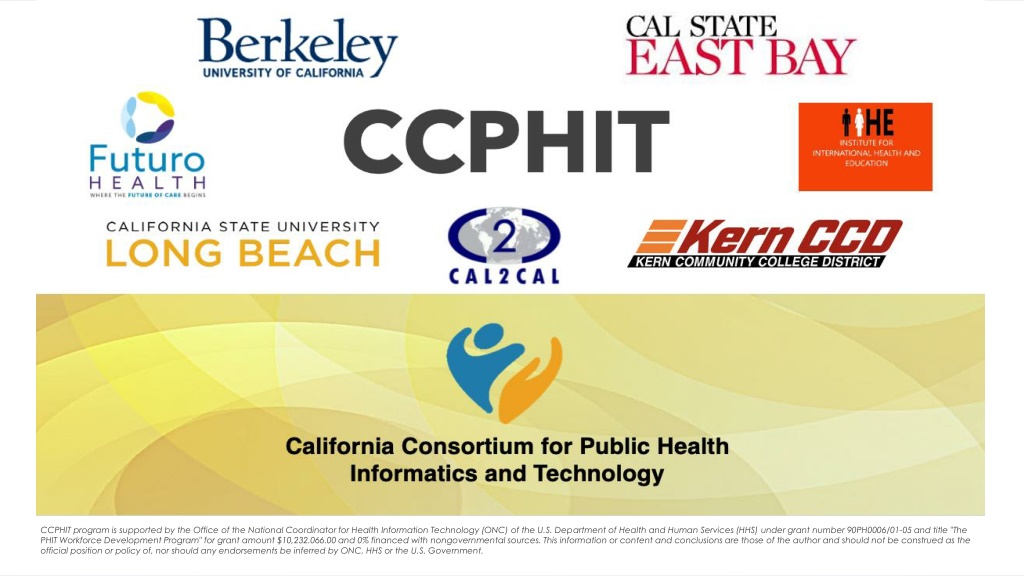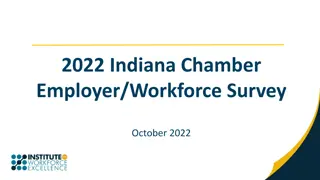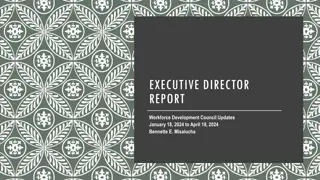CCPHIT Workforce Development Program in California
The CCPHIT Workforce Development Program in California, supported by ONC under grant number 90PH0006/01-05, aims to develop public health informatics and technology curricula to meet the informatics needs of public health employers. Led by Dr. Kamiar Alaei and Gora Datta, the program focuses on creating a diverse PHIT workforce through partnerships with educational institutions and public health entities. By establishing a pipeline from community colleges to universities, CCPHIT is addressing future public health challenges with a health equity lens.
- PHIT Workforce
- Public Health Informatics
- California Consortium
- Health Technology
- Workforce Development
Download Presentation

Please find below an Image/Link to download the presentation.
The content on the website is provided AS IS for your information and personal use only. It may not be sold, licensed, or shared on other websites without obtaining consent from the author. Download presentation by click this link. If you encounter any issues during the download, it is possible that the publisher has removed the file from their server.
E N D
Presentation Transcript
CCPHIT Workforce Development Program (CALIFORNIA CONSORTIUM FOR PUBLIC HEALTH INFORMATICS AND TECHNOLOGY) CCPHIT program is supported by the Office of the National Coordinator for Health Information Technology (ONC) of the U.S. Department of Health and Human Services (HHS) under grant number 90PH0006/01-05 and title "The PHIT Workforce Development Program" for grant amount $10,232.066.00 and 0% financed with nongovernmental sources. This information or content and conclusions are those of the author and should not be construed as the official position or policy of, nor should any endorsements be inferred by ONC, HHS or the U.S. Government.
2 Introducing CCPHIT COOPERATIVE AGREEMENT AWARDED (Lead MSI - CSULB): 9/21/2021 ONC PHIT FAQ Consortium objective: Develop public health informatics and technology curricula using a health equity lens, with a pipeline from community colleges to 4-year universities and inclusive of current workers, preparing them to meet the informatics needs of public health (PH) related employers. Our program joins California s community colleges, Cal State campuses, and University of California in complementary roles to form CCPHIT in partnership with public health entities. Regional public health departments and relevant healthcare and private industry partners who are committed to providing experiential learning opportunities for participants. CCPHIT can successfully contribute to meeting workforce needs in PH informatics, applying our collective strategies to creating a sustainable, ongoing pipeline of a diverse PHIT workforce to assist in addressing future Public Health challenges. The consortium is 3-tier in its educational institutions with the community colleges as our frontline of engagement with communities. The educational institutions in the consortium will sustain the teaching of the new PHIT courses and motivate other educational institutions outside our consortium to replicate these types of courses. View funding announcement on the ONC webpage: https://www.healthit.gov/topic/interoperability/investments/public-health-informatics- technology-phit-workforce-development
3 CCPHIT Leadership at CSULB Dr. Kamiar Alaei (Lead PI, CSULB) is a professor at CSULB and a global health policy expert, who has been working in conservative social settings for two decades. He has also worked in several countries in the Middle East and Central Asia. Dr. Alaei studied medicine, epidemiology, international health, health policy, and international human rights law at prestigious universities such as Harvard and Oxford. Dr. Alaei co-founded the first Triangular Clinic for three target groups in Iran (drug users, HIV patients, and STD cases), documented by the World Health Organization as a Best Practice Model. - kamiar.alaei@csulb.edu Gora Datta (Project Director) is a US-based serial entrepreneur and an internationally acknowledged subject matter expert on Information & Communication Technology, Health Information Technology Standards, & CyberHealth initiatives. Datta is an accomplished, visionary executive with 38 years of international professional expertise in the field of Computer & Software Engineering and its application to Healthcare, Mobile Health, CyberSecurity, IoT, Blockchain, eLearning and Social Protection. Datta is the founding Chairman and CEO of CAL2CAL group of companies, a multi-national innovative ICT products and solutions organization. Datta also serves on the Board of multiple organizations both for profit and non-profit entities. - gora.datta@berkeley.edu
4 CCPHIT Leadership in the SF Bay Area Dr. Susan L. Ivey (Lead PI- UCB) is a public health and health policy expert. She is the medical director for clinics at the City of Berkeley division of PH. There she was responsible for implementing the NextGen EHR and moving the clinical services teams through meaningful use and a variety of quality improvement efforts. She is a professor at UC Berkeley School of Public Health and teaches in the UCB-UCSF Joint Medical Program. She is also the director of research at Health Research for Action. Dr. Raja Sengupta (co-PI, UCB) is Professor, College of Engineering, in the Department of Civil and Environmental Engineering. He holds a PhD and MS in Systems Engineering, EECS Department, at University of Michigan, and a BS degree in Electrical Engineering. He focuses on wireless networks, transportation, robotics, and embedded computing. Dr. Arnab Mukherjea (PI, CSUEB) is Associate Professor and Chair, Department of Public Health, College of Sciences. He holds a DrPH and MPH from UCB with a focus in Health and Social Behavior and Applied Health Disparities. He conducts community- based research in immigrant health issues including intervention studies for chronic disease prevention.
5 CCPHIT Leadership in Community Colleges and Incumbent Workforce Dr. Craig Hayward (PI, Bakersfield College) is Associate Vice Chancellor of Analytics & Innovation at Bakersfield College. He provides leadership in the application of data, analytics, and modeling to the development of programs and initiatives that increase student engagement, access, and success, including employment to good, "high road" jobs. Dr. David Gatewood (PI, Shasta College) is Dean of Health Sciences & University Programs at Shasta College. He also serves on the Board of several not-for-profit organizations dedicated to public-private partnerships and committed to developing education pathways leading to social and economic mobility. Van Ton-Quinlivan (PI, Futuro Health) is nationally recognized in workforce development and a catalyst for inclusive economic mobility through higher education. She is the former Executive Vice Chancellor of the California Community Colleges. Currently, she is the CEO of Futuro Health, whose nonprofit mission is to improve the health and wealth of communities by growing the largest network of allied healthcare workers in the nation.
6 Building on CCPHIT Goals: REDUCT HEALTH DISPARITIES AND INEQUITIES CURRICULUM FOCUS PHIT WORKFORCE DEVELOPMENT 1. Designed to meet the needs of local public health care agencies 2. Set diverse students up for career success in the PHIT training program 3. Create equity-informed and culturally responsive courses 4. Expand curricula to other colleges, universities, students, and current workers to meet the data needs of California communities Reduce longstanding health disparities and inequities, this program will prioritize recruiting underrepresented minorities from multiple colleges including HBCUs, TCUs, HSIs, AANAPISIs, and MSIs. Train at least 700 individuals in public health informatics and technology to expand the nation s public health workforce.
7 Desirable Skills & Curriculum Development An employer needs assessment survey was done to gather feedback on current and future workforce need within the public health and health workforce. Most desirable skills: Analytical thinking Ability to combine data from different sources Data management/security Data privacy Data analysis Data mining Use of electronic health records/interoperability (HL7/FHIR) Creation of dashboards/data visualization
Employer survey: skills scan Current Workforce: Most highly sought-after skills Out of 4 Systems interoperability (e.g., HL7, EHRs) Analytical thinking Combining data from different sources Electronic health records/systems/registries 3.94 3.89 3.89 3.83 Future Workforce: Anticipated top skills Systems interoperability (e.g., HL7, EMRs) Analytical thinking Combining data from different sources Digital health/Devices/mHealth Dashboards/Data visualization Data privacy Electronic health records/systems/registries 4 3.94 3.94 3.94 3.87 3.87 3.82 Ivey, Hayward, Dean - 2022
Job Scraping initial Results: Frequency of skill inclusion in job postings (Indeed.com, EMSI skill extractor) Health Informatics Electronic Medical Record Public Health Communications Operations Management Information Technology Data Management Data Analysis Leadership Planning Investigation Epidemiology Service Delivery Presentations Integration Data Science Information Systems Health Information Systems (HIS) Data Collection Computer Science 0 5 10 15 20 25 Hayward, Dean, Fernandes, 2022
10 Core PHIT Courses as of 3/2023 Core undergraduate courses (4): Introduction to Public Health Informatics and Technology ( on ramp , community colleges leading; Piloted at CSULB in Spring, to launch summer 2023 at community colleges) The Role of Data in Public Health Informatics (introductory analytics, CSUEB; community college analytics to be completed in 2024) Public Health Maps and Spatial Analytics for Health Equity (Arc-GIS use, mapping, handling geographic information, dashboards, and StoryMaps; UCB, launched Spring 2023; running summer 2023) Emerging Technologies for Public Health (applications devices, APIs, health apps, machine learning skills; HL7/FHIR, data security; UCB COE, planned for Fall 2023) Graduate courses (2-3): UCB built 2 courses that are multi-level Undergrad plus graduate level courses (applied technology in PH and spatial analytics in PH); Currently creating a graduate level data visualization course that will use Tableau and will also focus on creating information at low literacy/numeracy levels for public-facing materials
11 More than 50 partners (and growing) Partner organizations include: 1. Universities: CSU Long Beach (Lead, PI: Alaei), UC Berkeley (PI: Ivey - SPH; co-PI: Sengupta - COE), and CSU East Bay (PI: Mukherjea, PH) 2. Community Colleges: 10 Colleges have participated, including Bakersfield College (PI: Hayward), Shasta College (co-PI: Gatewood), East LA College (ELAC), Long Beach City College, Saddleback College, and others 3. Public Health: CDPH and a number of County or City PH partners (10) 4. Professional Associations: 10 Associations 5. Corporate Partners: Futuro Health (KP/SEIU); Cal2Cal, and 10+ partners
12 How CCPHIT can Benefit your Organization Address organizational data needs, including: Helping train students in PHIT to be new and diverse staff; expanding PH informatics skills needed for CDC s data modernization efforts. Retaining existing staff by providing high quality training opportunities; upskilling staff to meet your informatics and technology needs. Improving support for IT in your systems and worker capacity to better handle data, analyze data, and create internal and external facing informatics products/visualization from current data sources. Develop a California PH workforce that understands data management, security, application, and analytics. 1. 2. 3. 4.
13 How can you also join in to help CCPHIT? We have funding for about 700 student interns in the next 2.5 years so we are looking especially to place paid interns in positions where they can start to use their PHIT and Health IT skills. During the period of the federal award, CCPHIT can cover up to 120 hours of time as a stipend to support students. Internships can run in the summer or during the academic year depending on the student s schedule and your preference. We will have students at the community college (AS Health IT with PHIT coursework), undergraduate (4 course PHIT certificate multiple majors), and graduate student (3 course PHIT certificate + MPH; assessing options for engineering and business Master s students).
14 Questions? Project Manager Contact: Jeremy Ramirez, DrPH, MPH, CSSBB, CSM Project Coordinator | CCPHIT Research Foundation California State University, Long Beach jeremy.ramirez@csulb.edu Academic Contact at UCB: Susan L. Ivey, MD, MHSA, Lead PI for UCB SPH Director of Research, Health Research for Action sivey@Berkeley.edu
15 Thank you!

 undefined
undefined


























